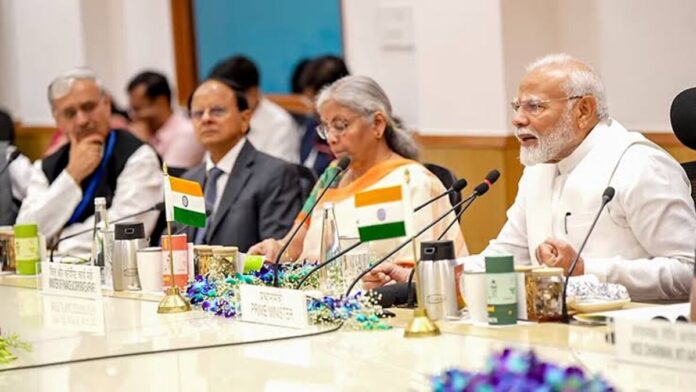In a meeting with economists on Thursday, Prime Minister Narendra Modi identified the manufacturing and rural business sectors as the two main areas of focus, along with a renewed emphasis on jobs.
The Prime Minister is reported to have also discussed the difficulties of center-state relations, specifically with regard to the centre funding numerous programmes or schemes and states not taking full responsibility for implementing these on the ground, less than two weeks before the Union Budget 2024–25 is presented on July 23.
Principal Secretary P K Mishra and Finance Minister Nirmala Sitharaman attended the meeting, which took place in the NITI Aayog office.
About 20 economists and experts including Arvind Virmani, Surjit Bhalla, Amita Batra, Prachi Mishra, S Mahendra Dev and Ashok Gulati spoke for five minutes each. NITI Aayog Vice Chairman Suman Bery and NITI Aayog CEO BVR Subrahmanyam also participated.
“The key agenda was the goal of becoming a developed nation by 2047, along with the need to step up job creation. Deliberations mostly focused on the measures that can be taken in the manufacturing, agriculture and rural sectors to move towards that goal,” a person in the know said.
The rural economy was examined in detail, with economists raising concerns about agricultural growth, pointing out the dearth of jobs in rural areas, and highlighting the slow growth of credit despite small-ticket loans extended under the Mudra scheme to boost output. The rural economy is already being closely watched for stagnant wage trends and tepid consumption demand.
Later in the evening, Prime Minister Modi posted on X: “Earlier today, interacted with eminent economists and heard their insightful views on issues pertaining to furthering growth.”
It is believed that Prime Minister Modi has discussed the employment issue extensively, and the figures may not provide a complete picture. He is reported to have stated that there was a problem with “shram ki pratishtha,” or the dignity of labour.
According to reports, the manufacturing sector was also thoroughly discussed. The view was that India should be manufacturing many more things and how manufacturing will play a crucial role not only in achieving a higher rate of economic growth but also in achieving the strategic goal of getting into global supply chains. Concerns over the textiles sector, where India was once a world leader, were also brought up in the meeting, they said.
Taxation rates also featured in the discussions between the economists and the Prime Minister. “The issue of multiple slabs under GST (Goods and Services Tax) was discussed in the meeting. It was noted that there is a need to reduce the multiplicity of rates,” the person said.
Policymakers have expressed concern over flagging consumption trends because they believe that a resurgence of these trends will be essential to increasing demand, which is necessary to kick-starting an all-encompassing cycle of investment, particularly private capital expenditure in consumer-focused sectors.
As previously reported by the news agency, pre-budget internal conversations reportedly discussed the necessity of rationalising both the direct tax rates and the GST rates for lower-income categories.




